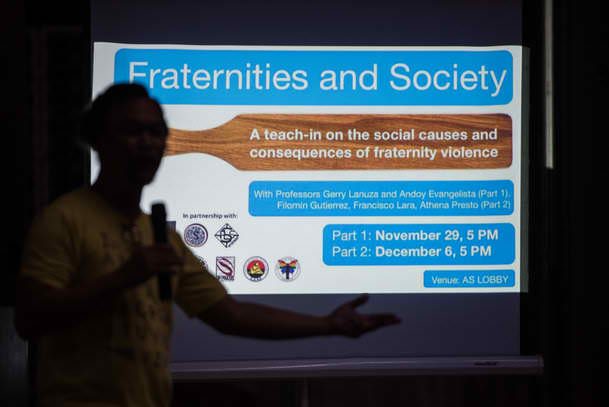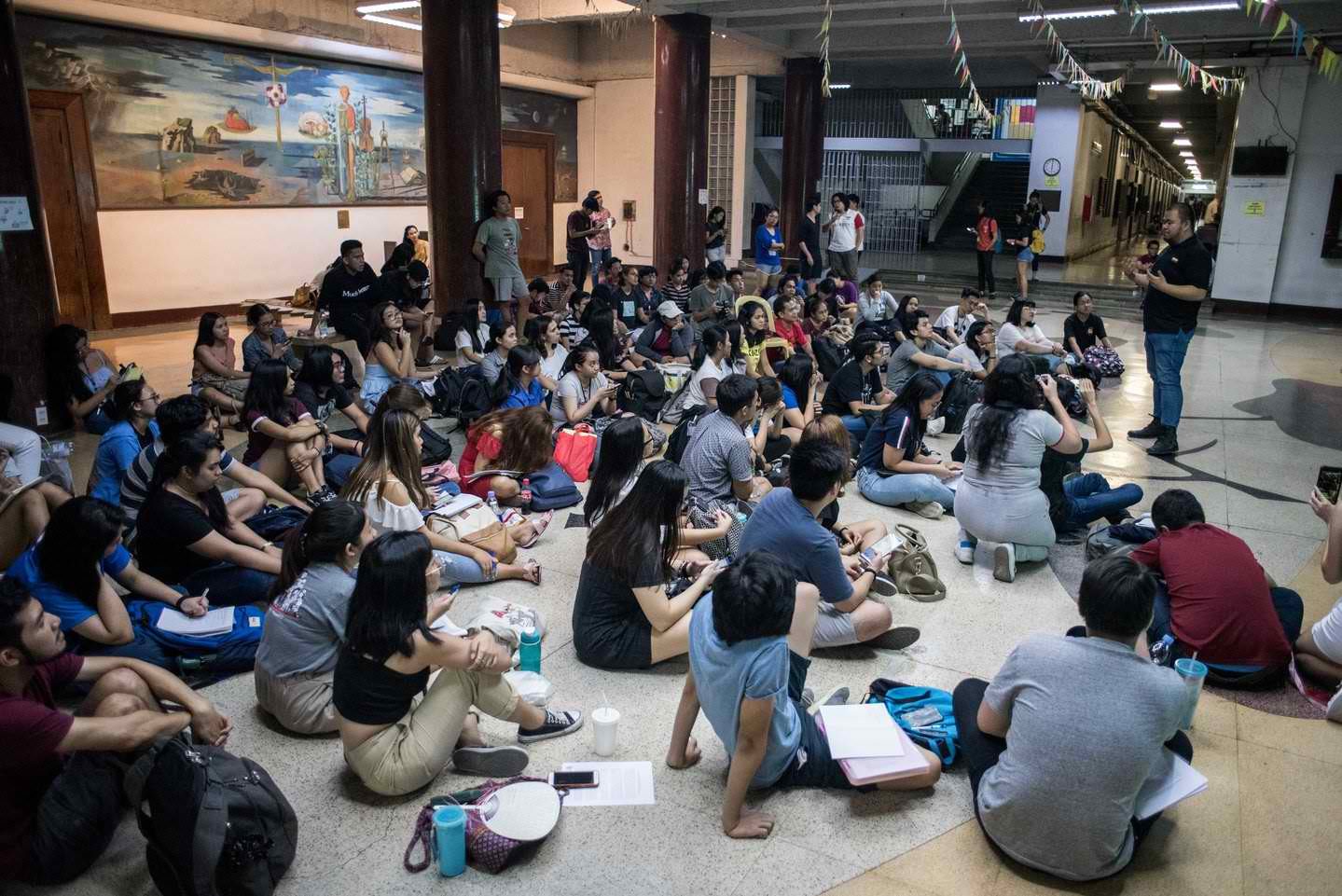SUMMARY
This is AI generated summarization, which may have errors. For context, always refer to the full article.

MANILA, Philippines – With the recent incidents of frat-related violence (FRV) reported on campus, the University of the Philippines (UP) Department of Sociology has started a series of teach-ins to make students understand what breeds this medieval thinking among frat men.
The first session about fraternities and society, held on November 29, tackled what frat wars are as well as where machismo, sexism, bigotry, and homophobia are rooted and embedded in society. (READ: UP’s gangland wars: A historical note)
An unverified but viral series of offensive, sexists, and hateful conversations attributed to a UP fraternity and the recent FRV incidents on campus sparked discussions on whether these organizations should still exist. (READ: Inside the brotherhood: Thoughts on fraternity violence)
The UP Department of Sociology was among the first departments in UP that posted a statement to denounce the alleged frat conversations.
Reinforced in families
Professor Gerry Lanuza said it all boils down to a flawed patriarchal system that enforces the domination of men over women. This way of thinking is deeply embedded in society through “family socialization,” where men are raised to be dominant and analytic. Women, on the other hand, are raised to possess the opposite of what are deemed to be masculine traits. This culture dates back from the time of colonizers, with machismo being an example of a value we developed from Spaniards.
“Ang ipinapaliwanag ko dito ay sa isang malapiyudal na pamilya, na patriarchal, kung saan ang tatay mo ay siyang pinaka-head sa hierarchy – eto ang kalalabasan,” Lanuza said. (My explanation is that in a feudal-like family, wherein the father is the head of the hierarchy, this would be the result.)

A patriarchal system manifests later on in fraternities, where a show of strength and masculinity is important to show power within and among other fraternities. At times, this will result in rumbles or fraternity-related violence to see who has the upper hand.
While Lanuza recognized that fraternity violence is rooted in our faulty and patriarchal system, he noted that such incidents must neither be condoned nor ignored.
He said this culture is not irreversible.
“Hindi ko sinasabi na fixed ito. Hindi ko sinasabi na nasa genes…. Ang sinasabi ko ay produkto iyan ng dynamic socialization sa loob ng pamilya. So, ang ibig sabihin, mababago ‘yan,” Lanuza said.
(I am not saying that this is fixed. I am not saying that this is in the genes…. What I am saying is that this is a product of dynamic socialization in a family. It means it can be changed.)
Patriarchy and how we understand it
Sociology professor Andoy Evangelista explained how patriarchy manifests in fraternities and in society.
A patriarchal system exists to maintain power within the lineage.
“Ang gustong tiyakin ng patriarchy ay ‘yung line of inheritance of wealth and power ay mananatili sa kanyang bloodline,” said Evangelista. (The patriarchy wants to ensure that the line of inheritance of wealth and power will stay in his bloodline.)
The same mindset can be found in fraternities and sororities: the connection and power they have should stay within the group and be passed on to their brothers and sisters.
Symbols also legitimize the violence inherent in patriarchy, evident in initiation rites of fraternities and sororities.
Evangelista cited a quote from a group of men, “We will give light to the world.” This is similar to Upsilon Sigma Phi’s motto, “We gather light to scatter.”
He pointed out the problematic thinking enforced by the motto. It is misogynistic in implying that only the group can enlighten the world.
Change in the system and ourselves
Although violence is deeply seated in culture and society, we also have ourselves to blame.
“Kung ang pangarap natin ay isang lipunan na anti-capitalist, anti-misogyny, anti-patriarchal, we have to also examine our own positions kasi produkto rin tayo ng lipunan na iyon,” said Evangelista.
(If our dream is a society that is anti-capitalist, anti-misogyny, anti-patriarchal, we have to also examine our own positions because we are also a product of that system.)
Sociology professor Jo Dionisio left a few remarks on how we can better our society and ourselves.
“Kailangan din natin tingnan ang paraan ng pag-iisip, pananalita, at interaksiyon sa mga kapwa, na siyang pinagdadaanan kung pano napapanitili ang ganitong sistema,” said Dionisio.
(We also have to look at our way of thinking, speaking, and interacting with other people that enables this kind of system to keep going.)
“Violence is in our everyday lives, and if we want to get rid of violence [in our society], we have to get rid of it in our everyday lives,” added Dionisio.
Part two of the discussion will be on Thursday, December 6. – Rappler.com
Jaira Krishelle Balboa is a Rappler intern and a 4th year BA Journalism student at the Polytechnic University of the Philippines.
Lisa Marie David is a Rappler intern and a 4th year AB Journalism student at the University of Santo Tomas.
Add a comment
How does this make you feel?
There are no comments yet. Add your comment to start the conversation.